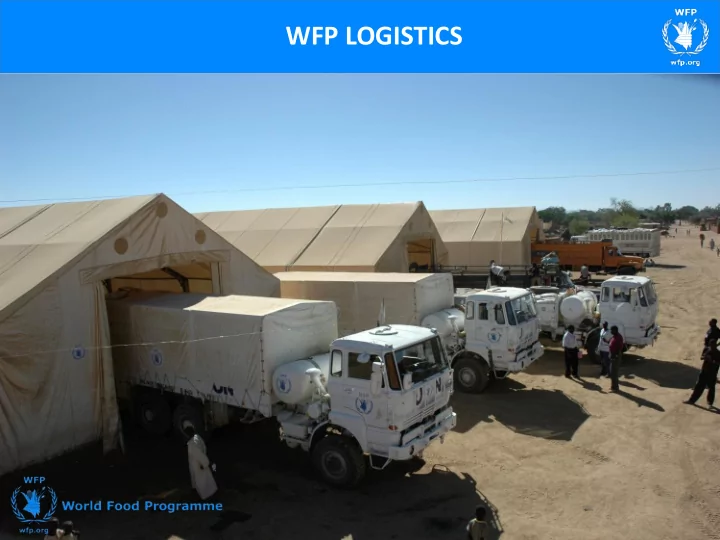

WFP LOGISTICS
CONTENTS • World Food Programme: Who we are • How WFP Logistics Works • Logistics Supply Chain • Inter-agency Logistics Services - UN Humanitarian Air Service (UNHAS) - UN Humanitarian Response Depot Network (UNHRD) - Emergency Telecommunication Cluster - Logistics Cluster • Training and Tools
WHO WE ARE • The United Nations frontline agency in the fight against hunger • 5 million tons of food annually distributed to 100 million people in 80 countries • Respond to disasters worldwide in support of governments • Expertise and coordination in food security analysis, nutrition, food procurement and logistics to support national governments and the wider humanitarian community.
HOW WFP LOGISTICS WORKS • Strength: “Deep - field presence” • Goal: “ to deliver the right food ration to the right people at the right time at the right cost” • Logisticians and specialists in field operations – Shipping – Aviation – Surface transport – Forwarding – Warehousing – Civil Engineering • Governments and private sector partnerships for specialised services/skills
WFP Supply Chain International/Local Procurement Distribution Vessels Trucks/ Storage Rail Helicopters/ Airplanes
OCEAN TRANSPORT 40 ships on average on the high seas at any given time
OCEAN TRANSPORT: Major Routes Aarhus Hamburg Antwerp/Rotterdam Xingang Toronto Venice Montreal Istanbul Mersin Tianjin Yokohama Karachi Mundra Laem Chabang Ho Chi Minh City Pasir Gudang Charter: 1,500,000 MT Walvis Bay Buenos Aires Durban Adelaide 125 shipments Liner: 1,100,000MT, 1,500 shipments 68 Load Ports + 72 Discharge Ports worldwide
WFP AVIATION
WFP AVIATION • Air support to WFP Operations Food airlifts and airdrops in emergencies e.g. airdrop operations in DRC, Sudan, Philippines, Pakistan • Strategic airlift to other humanitarian agencies Transports non-food items and urgent relief items e.g. UNICEF, UNHCR • Security & Medical evacuations For all humanitarian personnel • United Nations Humanitarian Air Service (UNHAS)
LAND TRANSPORT
LAND TRANSPORT • Commercial operators represent the backbone of WFP’s logistics strategy • In depth knowledge of existing logistics capacities, in countries where WFP operate • Long term relationships established Market Knowledge Established relationships with forwarders 200+ Commercial Transport Contracts Customs Agreements/Accelerated Procedures
LAND TRANSPORT WFP Fleet • WFP only deploys assets as a last resort, in areas where commercial capacities are non-existent or limited • WFP owns over 900 trucks • Typically off road vehicles (6x6)
INTER-AGENCY LOGISTICS SERVICES • United Nations Humanitarian Air Service (UNHAS) • United Nations Humanitarian Depot (UNHRD) • Emergency Telecommunication Cluster • Global Logistics Cluster Lead
INTER-AGENCY LOGISTICS SERVICES
INTER-AGENCY LOGISTICS SERVICES UNHAS
INTER-AGENCY LOGISTICS SERVICES UNHAS • Recent Operations (2008 – 2011) - Afghanistan, Haiti, Somalia, - Nepal, Myanmar, Philippines, - Ethiopia, DRC, Niger, CAR, Chad, - West Africa, Kenya, Tanzania, Sudan , Libya, Horn of Africa • Emergency Evacuations (2011) - Security evacuations = 86 - Medical evacuations = 184 • Regular Operations (2011) - 870 agencies served - 354,618 passengers - 3,447 mt of cargo transported
INTER-AGENCY LOGISTICS SERVICES United Nations Humanitarian Regional Depot-UNHRD • 24/48 hours emergency response • To support WFP in meeting its corporate goal of being prepared to respond to large scale emergencies at any given time • To support the emergency response efforts of UN, international, governmental and non-governmental organizations (40 clients)
INTER-AGENCY LOGISTICS SERVICES UNHRD – Benefits • Storage service • Real time stock visibility • Cost efficiency • Procurement possibilities • Coordination with partners • Staging areas • Standardization • Training facilities • Fast emergency Response • Air and sea connectivity
INTER-AGENCY LOGISTICS SERVICE UNHRD - Standard stocks Among the stock pile of items UN agencies store in the network. The most commonly used items below can be accessed: • Family tents • Blankets • Tents /Tarpaulins • Water and sanitation equipment • Inter-agency health kits • Mobile storage unit • pre-fabricated office/living accommodation • Generators • Boats • Motorcycles • Personal Protection Equipment
INTER-AGENCY LOGISTICS SERVICES UNHRD – network map 5 strategically located UNHRD depots globally
INTER-AGENCY LOGISTICS SERVICES UNHRD – Partners UN Agencies, International Humanitarian Organisations, Governmental Organisations and NGOs which have signed a Technical Agreement (TA) with WFP for the provision of UNHRD Network services
Emergency Telecommunications Cluster (ETC)
Emergency Telecommunications Cluster (ETC)
The Logistics Cluster
Logistics Cluster Key roles and responsibilities Provides field Clusters with strategy, policy guidance, mobilisation support and / or surge capacity Advocate for and support preparedness / capacity building projects Promote the integration of services, systems and information Facilitate the exploitation of shared assets, aptitudes and competencies
Logistics Cluster Service Portfolio
WFP TRAINING AND TOOLS Trainings for WFP staff and partners • Emergency trainings: Logistics Response Trainings (LRT) • Emergency Response Training • Technical Field Operation Training (TFOT) • Service Transport Contracting and Port Operations Management Trainings • Service Mindset e-learning training • Medical Logistics training (logistical handling of medical items); • Continued training on cluster awareness and deployments. Operational Tools • Logistics Operational Guide • UNHRD Warehouse Management System • Fleet Management System (FMS) for WFP truck operations • Relief Items Tracking Application • Flight Management Application
Thank you
Recommend
More recommend